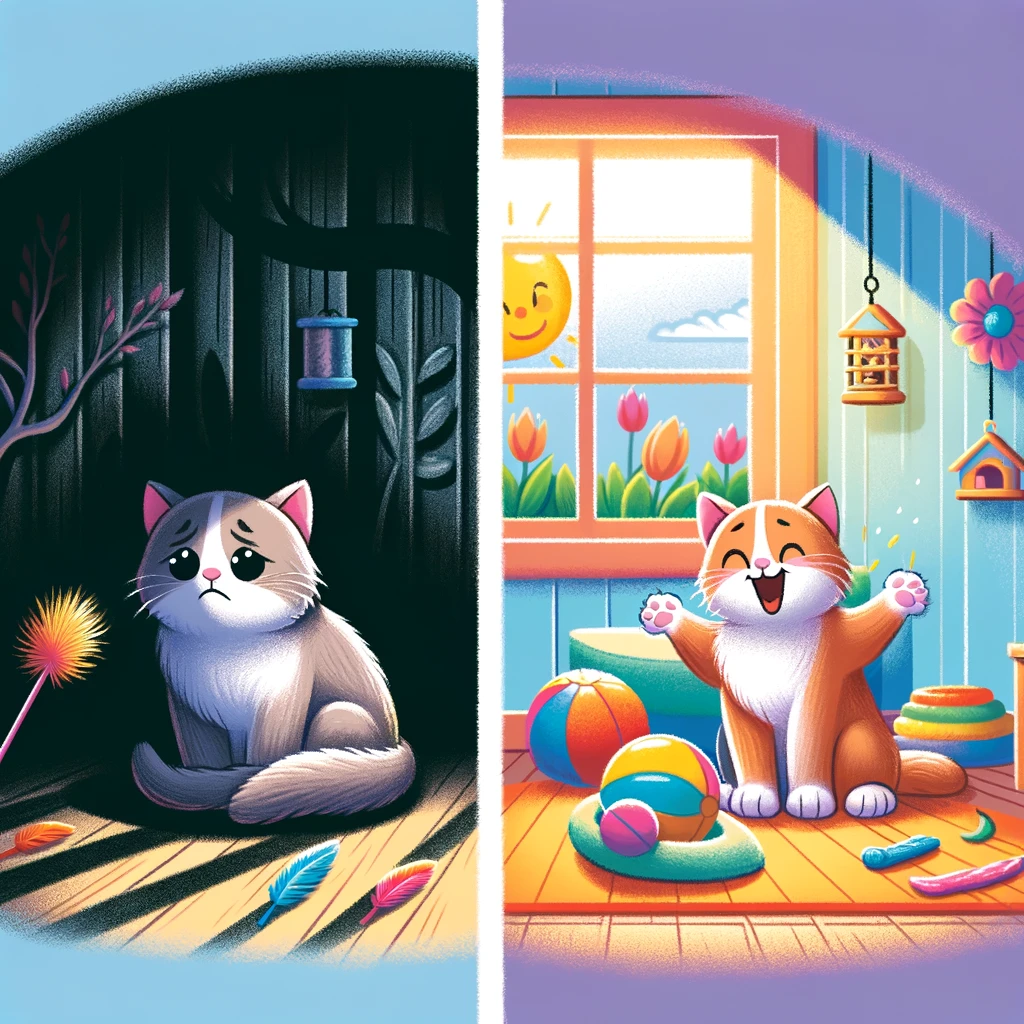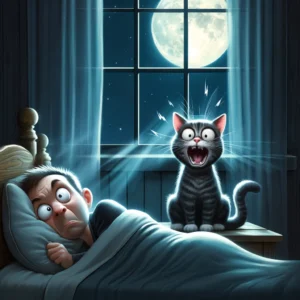Turning a stressed cat into a playful and relaxed one can be a rewarding experience for both the pet and the owner. Here are some strategies to help transition your cat from feeling stressed to being in a playful mood:
Keeping your cat happy involves more than just meeting their basic needs; it’s about enriching their environment and engaging with them in meaningful ways. Regularly cleaning their living space, including their litter box, is crucial as cats are very particular about cleanliness. A clutter-free environment helps reduce their stress and makes your home more navigable for them.
Routine vet checkups are essential to maintain your cat’s health. These visits ensure that any potential health issues are addressed promptly, and keeping up with vaccinations and parasite control is vital for their long-term wellbeing.
Proper nutrition plays a significant role in your cat’s happiness. Feeding them high-quality food that suits their age, health status, and activity level will help maintain their energy and health. Always provide fresh water, and consider using a water fountain to encourage them to drink more, as cats often prefer moving water.

1. Create a Safe Environment
- Comfortable Space: Ensure your cat has a safe, quiet place where it can retreat and feel secure. This could be a room with soft bedding, low noise levels, and hiding places.
- Routine: Maintain a consistent routine for feeding, play, and cuddling. Cats are creatures of habit and thrive on predictability.
2. Encourage Play with the Right Toys
- Interactive Toys: Use toys that mimic prey behavior, such as wand toys with feathers or small plush toys that can be chased and pounced on.
- Puzzle Feeders: These can stimulate your cat mentally and encourage physical activity by making them work for their treats.
- Variety: Rotate toys to keep things interesting. Cats can get bored with the same toy day after day.
3. Engage in Regular Play Sessions
- Scheduled Playtime: Dedicate time each day to play with your cat. This not only helps to release pent-up energy but also strengthens the bond between you.
- Active Play: Engage in play that encourages your cat to chase, jump, or pounce. This can help reduce stress and provide healthy exercise.
4. Use Calming Techniques
- Feliway Diffusers: These emit synthetic pheromones that can have a calming effect on cats and are particularly useful in multi-cat households.
- Calming Treats: Some treats contain herbs or supplements that promote relaxation in cats.
- Gentle Petting: Many cats find rhythmic petting soothing. Learn where your cat likes to be touched—usually the base of the chin or the cheeks.
5. Monitor and Adjust the Environment
- Remove Stressors: Identify and eliminate sources of stress if possible. This might mean giving your cat more space, reducing loud noises, or separating pets that may not get along.
- Environmental Enrichment: Provide opportunities for your cat to engage in natural behaviors. Cat trees for climbing, window perches for bird watching, and safe outdoor enclosures can all enrich your cat’s environment.
6. Consider Professional Help
- If your cat remains consistently stressed and you’re unable to manage it, consider consulting with a veterinarian or a feline behaviorist. They can provide further guidance and possibly recommend medications or specific behavioral therapies.
Transitioning a cat from a state of stress to playfulness can take time and patience. It’s important to gradually introduce these changes and closely observe your cat’s reactions to different stimuli, adjusting your approach based on what they respond to positively.
FAQs
1. What are the signs that my cat is stressed?
Answer: Signs of stress in cats include hiding, decreased appetite, excessive grooming or scratching, changes in litter box habits, aggression, and increased vocalization. Recognizing these signs early can help you take steps to alleviate their stress.
2. How long should I play with my cat each day?
Answer: Ideally, you should aim for two or three play sessions per day, each lasting about 10-15 minutes. This can vary depending on your cat’s age, health, and preference. Kittens and younger cats may require more playtime due to their higher energy levels.
3. What kind of toys are best for stressed cats?
Answer: Toys that allow cats to express their natural hunting instincts are excellent. These include wand toys that you can dangle and move, laser pointers for chasing (always finish with a physical toy so they can feel a sense of catch), and small toys that can be thrown and chased. Make sure the toys are safe and cannot be swallowed.
4. Can diet affect my cat’s mood?
Answer: Yes, diet plays a crucial role in your cat’s overall health and mood. A balanced diet suited to their age, health status, and lifestyle can impact their energy levels and stress. Consult with your vet to choose the best food for your cat.
5. How can I create a safe space for my cat?
Answer: Provide a quiet, cozy area where your cat can retreat without disturbance. This could be a cat bed in a secluded corner, a box with soft bedding, or even a cat tree with perches at various heights. Ensure this space is away from high traffic areas in your home.
6. What if my cat doesn’t like to play?
Answer: Some cats may appear disinterested in play due to various reasons such as age, health, past trauma, or simply personality. Try different types of toys and activities. Also, consider engaging in gentle interactions like grooming or speaking softly to your cat to strengthen your bond.
7. Is it normal for a cat to have periods when they are less active?
Answer: Yes, it’s normal for cats to have periods of lower activity, especially as they age or during changes in the weather. However, a sudden drop in activity level, especially if accompanied by other signs of illness or stress, should prompt a consultation with your vet.

Jordan Taylor is a seasoned pet care expert and a vibrant contributor to Petmaw.com. With over a decade of experience in veterinary science, Jordan brings a wealth of knowledge and a deep passion for animals to every article. After earning a degree in Veterinary Medicine from the University of Alaska Anchorage, Jordan spent several years working in a busy veterinary clinic, where they honed their skills in pet nutrition, behavior, and wellness.
Jordan’s love for animals isn’t just professional; it’s a fundamental part of their life. Home is shared with three rescue Sloth, two cats, and a small flock of backyard chickens, each with their own rescue story and special place in Jordan’s heart. This personal connection to animals shines through in Jordan’s writing, making their advice not only expert but also empathetic and practical for pet owners.
At Petmaw.com, Jordan is dedicated to providing pet owners with the latest research, trends, and tips in pet care, from innovative feeding strategies to understanding the subtle signs of pet health issues. Whether you’re a seasoned pet owner or new to the pet parenting world, Jordan’s insights aim to enhance the well-being of pets and deepen the human-animal bond.
In their spare time, Jordan is an avid hiker, often found exploring the trails with their dogs. They also volunteer at local animal shelters, offering their expertise and helping animals in need find forever homes. Jordan’s commitment to animal welfare and passion for sharing knowledge makes them a cherished member of the Petmaw.com family and a trusted guide for our readers.






I appreciate the detailed explanation.